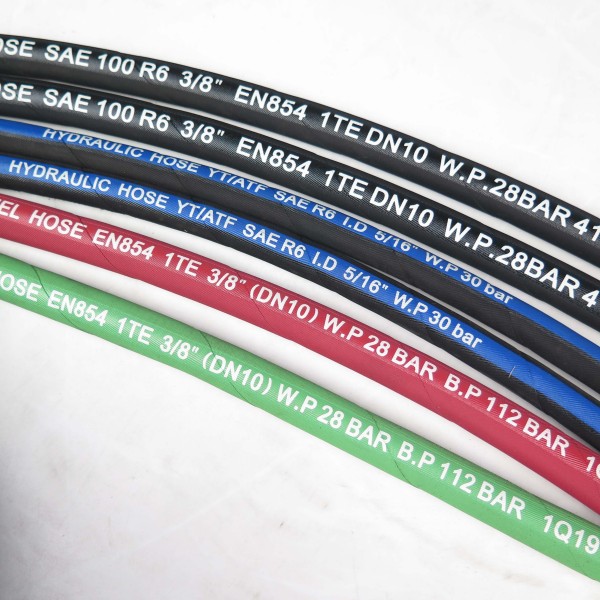335345435
Oct . 11, 2024 12:29 Back to list
Hydraulic Oil Hose Manufacturing Facility with Advanced Technology and Quality Assurance
The World of Hydraulic Oil Hose Manufacturing
In the ever-evolving landscape of industrial machinery, hydraulic systems play a pivotal role in powering various applications, from construction equipment to agricultural machinery. At the core of these systems, hydraulic oil hoses are essential components that facilitate the seamless transfer of hydraulic fluid under high pressure. The manufacturing of hydraulic oil hoses is a specialized field, combining advanced technology, high-quality materials, and meticulous craftsmanship to ensure safety and efficiency in industrial operations.
Understanding Hydraulic Oil Hoses
Hydraulic oil hoses are flexible tubes designed to convey hydraulic fluid between different components of a hydraulic system. They are engineered to withstand high pressures and temperatures, and their construction typically involves multiple layers of materials, including rubber, thermoplastic, and reinforcement textiles or steel wires. The combination of these materials determines the hose's strength, flexibility, and resistance to wear and tear.
The Manufacturing Process
The production of hydraulic oil hoses begins with the selection of raw materials. Top-tier manufacturers source high-quality rubber compounds and reinforcement materials to ensure that the final product meets industry standards for durability and safety. Once the materials are procured, the manufacturing process can commence, typically involving several stages
1. Extrusion The first step involves extruding the rubber compound to form the inner tube, which must be smooth to minimize friction and enhance fluid flow.
2. Layering Next, layers of reinforcement are added to the tube to provide structural integrity. Depending on the required pressure rating, manufacturers may use spiraled steel wires or textile braids. The number of layers directly influences the hose's ability to handle pressure without bursting.
3. Covering Once the reinforcement is in place, an outer layer of rubber or thermal plastic is applied. This cover protects the hose from external elements such as abrasion, chemicals, and UV light, ensuring longevity in harsh environments.
4. Curing The final stage of manufacturing involves curing or vulcanizing the hose in a controlled environment. This process helps to enhance the strength and elasticity of the rubber, ensuring that the finished product meets specific performance standards.
hydraulic oil hose factory

Quality Assurance
Quality control is a critical aspect of hydraulic oil hose manufacturing. Reputable factories implement rigorous testing procedures at every stage of production. This includes pressure testing to ensure the hose can withstand its rated capacity, as well as bend and twist tests to measure flexibility and resilience. Additionally, manufacturers often conduct durability tests to evaluate the hose’s resistance to environmental factors, such as temperature fluctuations and exposure to chemicals.
Technological Advancements
The hydraulic oil hose industry has witnessed several technological advancements that have improved efficiency and safety in manufacturing. Automated machinery and computer-aided design (CAD) software have streamlined the production process, allowing for precise specifications and reduced production times. Furthermore, advancements in material science have led to the development of hoses that are lighter, more flexible, and capable of handling higher pressures than ever before.
Sustainability in Manufacturing
As global awareness of environmental issues grows, many hydraulic oil hose manufacturers are committing to sustainable practices. This includes sourcing recyclable materials, reducing waste during production, and implementing eco-friendly processes. Manufacturers are also investing in research and development to create hoses made from bio-based materials, further reducing the industry’s carbon footprint.
The Importance of Choosing the Right Hose
For industries that rely on hydraulic systems, the choice of hydraulic oil hose is crucial. Selecting the correct hose ensures that machinery operates efficiently and safely, minimizing the risk of equipment failure or accidents. Clients should consider factors such as pressure rating, temperature tolerance, compatibility with hydraulic fluids, and environmental conditions when selecting hoses for their specific applications.
Conclusion
In conclusion, the hydraulic oil hose manufacturing industry is a vital component of modern industrial operations. By investing in quality materials, advanced manufacturing processes, and sustainable practices, manufacturers are not only enhancing the efficiency and safety of hydraulic systems but also contributing to a more responsible approach to industrial production. As technology continues to evolve, the future of hydraulic oil hoses looks promising, with innovations that will undoubtedly elevate their performance and reliability across various sectors.
-
SAE 100 R17 Black Smooth Cover Hydraulic Hose
NewsMar.07,2025
-
SAE 100 R17 Black Smooth Cover Hydraulic Hose
NewsMar.07,2025
-
SAE 100 R17 Black Smooth Cover Hydraulic Hose
NewsMar.07,2025
-
SAE 100 R17 Black Smooth Cover Hydraulic Hose
NewsMar.07,2025
-
SAE 100 R17 Black Smooth Cover Hydraulic Hose
NewsMar.07,2025
-
steel wire braided hydraulic hose
NewsMar.07,2025



